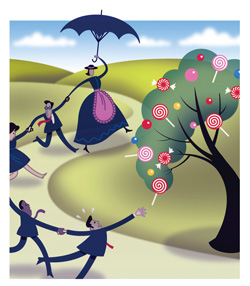It’s for your own good

Illustration by Jeff Dionise
Remember when you would open your dishwasher and those dishes would sparkle? You might not have experienced that particular euphoria lately because phosphates have been banned from household detergents in 16 states. What is a phosphate? It’s the ingredient that actually gets the dishes clean.
Detergent makers don’t want to blend different detergents for different states so they’ve just banned the stuff on their own. Isn’t that something we should have voted on? Heck, isn’t that something we at least should have known?
All we know is that our dishes are suddenly gunkier than we remember. And while we’re ready to concede that there’s a place for government regulation—the 2008 financial disaster proved as much, at least to everyone who doesn’t operate a derivative fund—can’t we find a middle ground between what we need and what we actually want?
By its nature, government seems to enjoy telling us what we can’t have (e.g., dietary and lifestyle choices) rather than what we can (e.g., more government, perhaps?). Some call it a “nanny state,” with government holding our hands through life and making our choices for us. Sure, sometimes it’s a pretty fat hand. And sometimes we can’t see the writing on the wall because we’re losing our sight from diabetes. But government doesn’t always know best. And it certainly doesn’t know how complicated it makes our lives.
Let’s imagine for a moment getting the kids ready for school, mindful of actual laws and regulations being brought to bear on our daily activities:
Before I make Susie’s lunch I need to turn on the newfangled compact fluorescent light bulb a half-hour early, and the lunch itself will need to pass muster with the preschool food police (yeah, I know there’s a kid out there with a nut allergy, but does that really mean my kid can’t carry PB&J in her lunch bag?).
I have to dress Johnny in his school uniform, careful to make sure his pants don’t sag and the color of his shirt doesn’t mark him as a member of a street gang.
And I better remind him to make sure he turns in his doctor’s note for yesterday’s absence to avoid another summons. And he better not gnaw his Pop-Tart into anything that resembles a gun. That will get him expelled.
I have to put the recycled items in the proper containers to avoid another fine. Oh, and I have to remember to pull the rain barrel in before one of the neighbors snitches that I’m collecting rainwater, and wash the car so I don’t get another ticket for getting dirt on the streets. After work I’ll kick back with a 32-ounce drink—er, better make that two 16-ouncers—or maybe make a milkshake with the black market raw milk I hide in the basement cooler.
Ridiculous? Maybe, but it’s based on actual restrictions on everyday activities that have been deemed offensive and made criminal by various legislative bodies across the nation. Each of these rules has its own legitimate rationale; but really, do we need a law to govern everything? Do we really have to dictate the outcome of every behavior?
Politicians claim they’re protecting us from ourselves, but who’s asking them to do it? Some of us would be happy just to have clean dishes.
Write a letter to the editor, share a story tip or update, or report an error.


